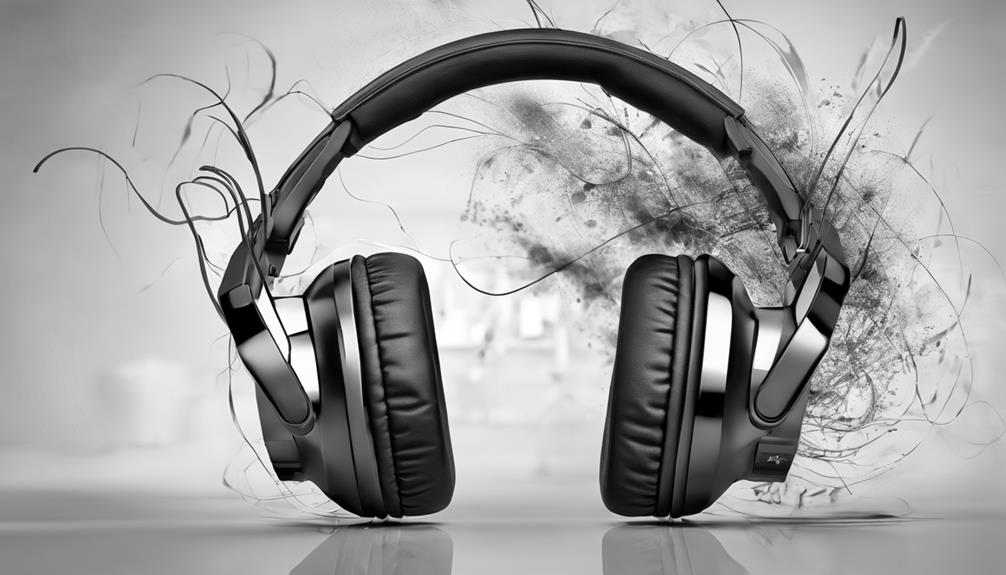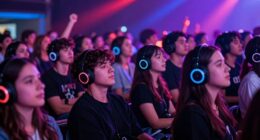Looking for assistive listening devices nearby can be overwhelming due to the vast array of choices available, making it feel like searching for a needle in a haystack.
The quest for the most suitable device can be daunting yet rewarding. By following some practical steps and tapping into various resources, we can navigate the realm of assistive technology with confidence and ease.
Explore how to pinpoint the perfect assistive listening device for your needs and discover the array of possibilities waiting to enhance your auditory experience.
Key Takeaways
- Explore local audiology clinics or hearing healthcare centers for personalized ALD recommendations.
- Check online directories for nearby hearing aid providers with positive reviews and reliable services.
- Utilize ALD retailer websites for product comparisons, specifications, and customer reviews.
- Consider government assistance programs like Medicaid or Medicare for financial aid in acquiring assistive listening devices.

Williams Sound Pocketalker Ultra Hearing Amplifier | Easy-to-Use Hearing Amplifier for Seniors | Amplified Sound Assistive Listening Device with Headphones for Elderly | Hearing Assist Earbuds
Pocketalker Ultra makes voices and conversations easier to hear by boosting the sounds you want while reducing background…
As an affiliate, we earn on qualifying purchases.
As an affiliate, we earn on qualifying purchases.
Benefits of Assistive Listening Devices
Assistive listening devices provide individuals with hearing loss the essential support they need to amplify sounds and enhance their overall auditory experience. These devices offer a range of benefits tailored to address specific challenges faced by people with hearing difficulties.
For instance, the ability of assistive listening devices to amplify sounds up to 110 decibels is crucial for individuals with severe hearing loss, ensuring they can perceive sounds that would otherwise be inaudible. Moreover, the inclusion of physical vibration features in some devices not only enhances accessibility but also provides alternative notification methods, such as waking individuals through vibrations.
Additionally, amplified telephones with adjustable settings can increase volume by 35 decibels, enabling personalized use for optimal hearing enhancement. Emergency notification devices emitting tones up to 90 decibels and providing vibrating notifications offer enhanced safety during critical situations. Understanding these benefits underscores the importance of assistive listening devices in improving the quality of life for individuals with hearing impairments.

Clarity P300 Landline Phone with Sound Amplification, Hearing Impaired Phones, Adjustable Ringer Pitch and Volume Control, Corded Phone Design
Loud and Clear: This big button corded photo phone for seniors, amplifies incoming sounds up to 26 dB,…
As an affiliate, we earn on qualifying purchases.
As an affiliate, we earn on qualifying purchases.
Types of Hearing Devices Available
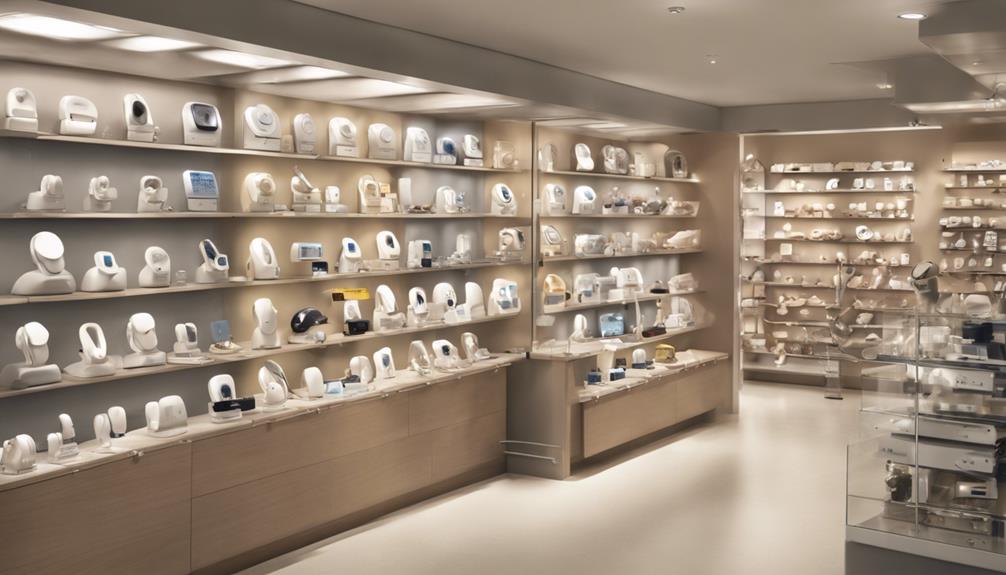
Exploring the array of available options for hearing devices broadens the scope of support and solutions individuals with hearing difficulties can access. Amplifiers, such as captioned phones, smartphones with specialized apps, and amplified telephones, are among the various assistive listening devices available.
For those with hearing impairments, hearing aid compatible phones with telecoils and television-compatible devices provide additional solutions. Alerting devices and wearable sensory/tactile devices contribute to safety and connectivity by amplifying sounds, offering visual cues, and utilizing vibrations.
TV amplifiers like TV Ears present wireless headset options tailored for clearer TV sound without the necessity of hearing aids. Moreover, wearable wrist devices like Neosensory offer tactile sensations to alert users to sounds they may not hear, catering to the needs of the hearing impaired and Deaf communities.
Understanding the diverse array of hearing devices empowers individuals to select the most suitable option to enhance their auditory experiences.

TV Ears Digital Wireless Headset System for Seniors – Personal Volume Control, TV Hearing Device, No Audio Delay, Plug-N-Play, Works with Most TV Brands, Ideal for Hearing Impaired – Model 11741
BATTERY CARE AND CHARGING NOTE: A full charge of at least 14 hours is recommended before first use…
As an affiliate, we earn on qualifying purchases.
As an affiliate, we earn on qualifying purchases.
Finding Local Hearing Aid Providers
When seeking local hearing aid providers, one effective approach is to search online directories or platforms in your area. These platforms often list a variety of professionals specializing in hearing aids, making it easier to find one near you. Look for providers with positive customer reviews and high ratings, as this can indicate their reliability and quality of service in fitting hearing aids.
Visiting audiology clinics or hearing healthcare centers is another way to explore different hearing aid options available. Local providers can offer personalized recommendations based on your specific needs. Additionally, inquire about insurance coverage or financing options for hearing aids from these providers to help manage costs.
Scheduling appointments for consultations and hearing tests with nearby hearing aid professionals is crucial in finding the right solution for your hearing needs. By taking these steps, you can connect with local experts who can assist you in acquiring the most suitable hearing aids for your situation.
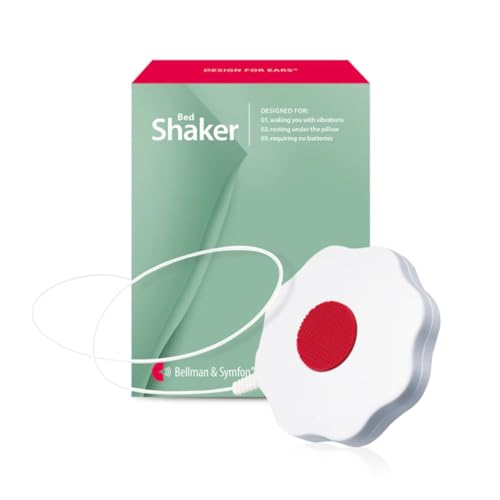
Bellman & Symfon Bed Shaker – Vibration Alert for Deaf and Hard of Hearing – Emergency Notification Aid for Seniors and Assisted Living Support – Not a Standalone Product – Bellman Accessory
𝐒𝐌𝐀𝐑𝐓 𝐀𝐋𝐄𝐑𝐓: Our Bellman & Symfon bed shaker is a smart vibration alert device designed specifically for the…
As an affiliate, we earn on qualifying purchases.
As an affiliate, we earn on qualifying purchases.
Online Resources for ALDs
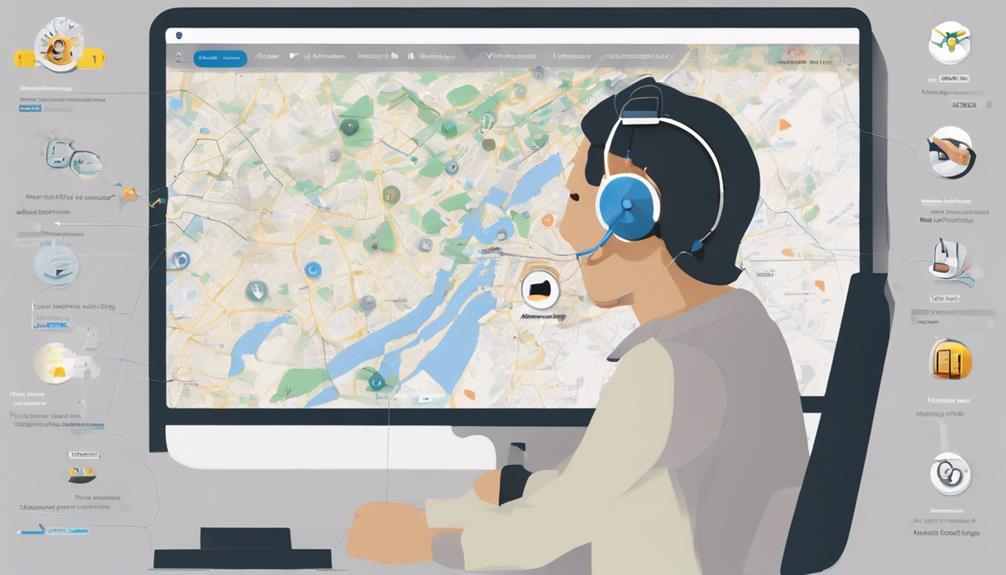
When exploring online resources for ALDs, we can benefit from ALD retailer websites that offer a variety of products catering to different needs. These websites often include ALD comparison tools that allow us to assess features, prices, and customer ratings conveniently.
Additionally, engaging in ALD user forums can provide valuable insights and recommendations from individuals with firsthand experience.
ALD Retailer Websites
Perusing various online retailer websites specializing in assistive listening devices (ALDs) provides a comprehensive array of product options and information. When exploring these platforms, you can access detailed product information, specifications, pricing, and customer reviews. Here are some benefits of utilizing ALD retailer websites:
- Convenient comparison of different models, features, and prices.
- Educational resources, buying guides, and recommendations available.
- Online promotions, discounts, and deals to help you save on purchases.
- Wide selection of products catering to various needs.
- Customer reviews offering insights into product performance and user satisfaction.
Utilize these online resources to make informed decisions and find the most suitable ALD for your requirements.
ALD Comparison Tools
Exploring online ALD comparison tools provides users with a comprehensive way to evaluate features, prices, and reviews of various assistive listening devices. These tools offer detailed specifications and customer ratings, aiding in informed decision-making. They allow easy access to a wide range of ALDs, including personal sound amplifiers, TV listening aids, and alarm systems. By utilizing these resources, individuals can efficiently locate nearby stores or online retailers offering specific assistive listening devices. Below is a comparison table showcasing different ALD options available in the market:
| ALD Type | Features | Price Range |
|---|---|---|
| Personal Amplifiers | Noise reduction, adjustable volume | $50 – $200 |
| TV Listening Aids | Wireless connectivity, multiple user support | $100 – $300 |
| Alarm Systems | Vibrating alerts, customizable settings | $30 – $150 |
ALD User Forums
Engaging with ALD user forums offers a wealth of insights and support for individuals seeking information on assistive listening devices. These forums provide a platform for sharing experiences, recommendations, and tips on choosing, troubleshooting, and maximizing the benefits of ALDs. Here are some key benefits of participating in ALD user forums:
- Seek advice on selecting the right ALD
- Troubleshoot issues effectively
- Stay informed about the latest advancements in ALDs
- Discuss various types of ALDs to meet specific needs
- Benefit from expert moderators and contributors' insights
Government Assistance Programs

When exploring government assistance programs for assistive listening devices, it's essential to understand the eligibility criteria that may include income levels, disability status, or specific needs.
The application process details, such as required documentation and approval timelines, are crucial aspects to consider when seeking financial support.
Additionally, individuals can explore the available device options covered by these programs to find the most suitable solution for their hearing needs.
Eligibility for Programs
Government assistance programs offer financial support to individuals who require assistive listening devices. Eligibility criteria are typically based on income levels, disability status, and specific requirements. When seeking assistance for hearing devices, it's essential to understand the eligibility criteria for these programs.
Programs like Medicaid, Medicare, and the Assistive Technology Act may offer assistance for acquiring listening devices. Some programs may require a prescription or recommendation from a healthcare professional for device coverage. Eligibility criteria often involve income levels, disability status, and other specific requirements.
Researching the guidelines of these programs can help individuals access necessary support. Understanding the application process and meeting the eligibility criteria are crucial steps in obtaining assistive listening devices through government assistance programs.
Application Process Details
To apply for government assistance programs for assistive listening devices, individuals seeking support must provide documentation verifying their disability or income eligibility. For those who are hearing impaired and require assistive listening devices, this documentation could include medical records confirming the hearing impairment.
Additionally, proof of income may be necessary to determine eligibility for subsidies or discounts. The application process typically involves filling out forms provided by the specific government program and submitting the required documentation. It's essential to carefully follow the instructions and provide accurate information to ensure a smooth application process.
Eligibility criteria may differ based on the location and the specific requirements of the government assistance program.
Available Device Options
Exploring the wide array of available assistive listening devices through government assistance programs offers individuals a range of solutions tailored to enhance communication and accessibility for those with hearing loss or disabilities.
Government programs provide various assistive listening devices, including:
- Amplified telephones
- Captioned phones
- TV listening aids
- Personal amplifiers
- Hearing aid compatible phones
These programs cater to individuals with hearing impairments or disabilities, aiming to improve their quality of life by offering affordable and effective solutions. Eligibility criteria may vary, but by taking advantage of these programs, individuals can access the assistive devices they need to better communicate and engage with the world around them.
Community Hearing Health Events

Community hearing health events offer valuable opportunities for individuals to access free screenings and explore a variety of assistive listening devices. These events serve as a platform for attendees to interact with experts who can recommend suitable devices tailored to individual needs.
By attending these events, participants can physically test different assistive listening devices to determine the most comfortable and effective option for them. Moreover, community events often showcase the latest technology and advancements in assistive listening devices, keeping attendees informed about the cutting-edge solutions available.
Beyond device exploration, these events also create a supportive environment where participants can engage with others facing similar hearing challenges. Additionally, attendees can learn about local resources for ongoing support and assistance, making these events not only informative but also a valuable networking opportunity for individuals seeking to improve their hearing health.
Comparison Shopping for Assistive Listening Devices

At this stage, our focus shifts towards examining various options available when comparing assistive listening devices to make informed purchasing decisions.
When delving into comparison shopping for assistive listening devices, consider the following key factors:
- Price Comparison: Compare prices of assistive listening devices like hearing amplifiers, sound amplifiers, and personal sound amplifiers to find the best deal for your needs.
- Customer Ratings and Reviews: Check customer ratings and reviews for different assistive listening devices to gauge their effectiveness and quality.
- Product Varieties: Look for product varieties such as digital sound amplifiers, rechargeable amplifiers, and Bluetooth-enabled amplifiers to suit your preferences.
- Features and Specifications: Consider the features and specifications of assistive listening devices like amplification levels, battery life, and connectivity options before making a purchase.
- Brands and Models: Explore different brands and models of assistive listening devices to find the one that best meets your hearing assistance requirements.
Tips for Trying Out Devices

When trying out assistive listening devices, we should focus on important points such as:
- Device trial locations
- Setting up the testing environment correctly
- Evaluating sound quality
These aspects are crucial in determining the effectiveness of the devices in real-world scenarios and ensuring they meet our specific needs. By paying attention to these points during the trial period, we can make informed decisions about which assistive listening device best suits our requirements.
Device Trial Locations
To explore different assistive listening devices and find the best fit for your needs, consider visiting local audiologists or hearing aid providers that offer trials. When looking for device trial locations, remember to:
- Check with hearing aid manufacturers or retailers for demo days.
- Explore online resources providing information on trial locations.
- Attend hearing health expos or events for a variety of device options.
- Contact hearing loss support groups for recommendations.
- Join local organizations to get suggestions on nearby trial opportunities.
These avenues can help you experience various assistive listening devices firsthand, allowing you to make an informed decision about the best solution for your hearing needs.
Testing Environment Setup
Exploring different assistive listening devices necessitates creating a suitable testing environment to accurately evaluate their performance and suitability for individual needs.
To set up a conducive testing environment, ensure there's background noise to mimic real-life conditions. Use familiar audio sources like music or spoken word to assess the device's clarity.
Test the device in various settings to gauge its adaptability and performance across different sound environments. If applicable, try the device with and without hearing aids to make a precise comparison.
Additionally, evaluate factors such as comfort, ease of use, and battery life during the testing process to get a comprehensive understanding of the device's capabilities in real-world sound scenarios.
Sound Quality Evaluation
As we embark on evaluating assistive listening devices for their sound quality, it's crucial to focus on the clarity and amplification of sounds to ensure they align with our specific needs.
When testing these devices, consider the following tips:
- Test the devices in various environments to assess performance in different noise levels.
- Check for distortion or feedback during use for a high-quality listening experience.
- Evaluate comfort and fit, including factors like earpiece design and adjustability.
- Look for features such as adjustable volume and tone control to enhance sound quality.
- Seek devices with background noise reduction capabilities to customize your sound experience effectively.
Understanding ALD Warranty and Support

When considering assistive listening devices (ALD), understanding the warranty and support options is crucial for ensuring long-term functionality and assistance. ALD warranties typically range from 1 to 5 years, providing coverage for repairs and replacements. Some manufacturers offer extended warranty options for additional protection, encompassing parts, labor, and technical support for troubleshooting needs. It's essential to note that activating the warranty often requires product registration. Manufacturers usually provide customer support through various channels like phone, email, or online chat for any warranty-related queries.
| ALD Warranty Facts | Details |
|---|---|
| Warranty Duration | 1 to 5 years |
| Coverage | Repairs, replacements, parts, labor |
| Activation Requirement | Product registration |
Understanding the warranty terms and support options can aid in maximizing the benefits of your ALD. By being aware of the coverage details and how to access support, users can ensure their devices remain in optimal working condition for an extended period.
Local Support Groups for Hearing Loss

Understanding the importance of community support in managing hearing loss, local support groups offer a valuable network for individuals facing similar challenges. These groups provide emotional support, educational opportunities, and a sense of belonging for those dealing with hearing loss.
Here are some key benefits of joining a local support group:
- Emotional support and sense of community
- Educational sessions and guest speakers
- Information on assistive listening devices, including amplifiers
- Sharing experiences and coping strategies
- Building a supportive network of understanding individuals
Frequently Asked Questions
What Is the Most Commonly Used Assistive Listening Device?
The most commonly used assistive listening device is the personal sound amplifier. It amplifies all sounds but lacks FDA approval like hearing aids. These devices resemble older pocket tape players and may harm hearing if not used properly.
Unlike hearing aids, personal sound amplifiers aren't tailored to individual hearing loss. While they can benefit those with mild hearing difficulties, they don't offer the same level of customization or address specific frequency or volume adjustments needed for various types of hearing loss.
What Is the Difference Between an Assistive Listening Device and a Hearing Aid?
When comparing assistive listening devices (ALDs) to hearing aids, it's crucial to understand that ALDs amplify sounds in various settings, whereas hearing aids are tailored to individual hearing loss.
ALDs aren't FDA-approved for treating hearing loss but are excellent for enhancing sound clarity. While hearing aids are personalized for specific needs, ALDs provide general sound amplification to improve listening experiences in public places.
Both devices serve unique purposes and can complement each other for enhanced listening abilities.
Where Are Assistive Listening Devices Required?
Assistive listening devices are required in public places like theaters, worship centers, and educational institutions to accommodate individuals with hearing impairments. The Americans with Disabilities Act (ADA) mandates their use in venues where auditory communication is integral.
Places such as movie theaters, lecture halls, and performance venues must provide these devices for equal access. They're also crucial in emergencies to alert individuals with hearing difficulties. Compliance with ADA regulations ensures inclusivity and accessibility for all.
What Are the Alternative Listening Devices?
We've explored the realm of alternative listening devices, which cater to various needs for individuals with hearing impairments. Personal sound amplifiers, TV listening aids, amplified alarm clocks, and telephone solutions offer support in different scenarios like TV viewing, waking up to alarms, and clearer phone conversations.
While personal sound amplifiers lack FDA approval, TV listening aids provide wireless options with captions. Amplified alarm clocks and telephones offer volume adjustments for enhanced communication and safety.
Conclusion
In conclusion, we've explored the various options available for finding assistive listening devices near us.
Whether through local providers, online resources, or government assistance programs, there are plenty of ways to access the technology we need.
By comparison shopping, trying out different devices, and seeking support from local groups, we can make informed decisions that enhance our quality of life.
Let's take the first step towards better hearing and explore the possibilities that await us.






